Resources
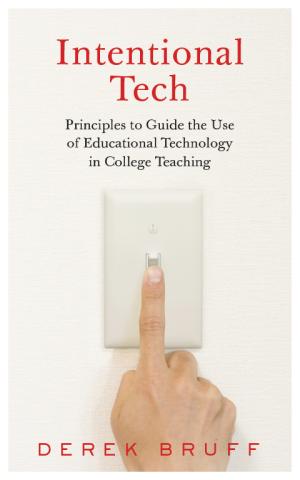
Chalkboards and projectors are familiar tools for most college faculty, but when new technologies become available, instructors aren’t always sure how to integrate them into their teaching in meaningful ways. For faculty interested in supporting student learning, determining what’s possible and what’s useful can be challenging in the changing landscape of technology. Arguing that teaching and learning goals should drive instructors’ technology use, not the other way around, Intentional Tech explores seven research-based principles for matching technology to pedagogy. Through stories of instructors who creatively and effectively use educational technology, author Derek Bruff approaches technology not by asking “How to?” but by posing a more fundamental question: “Why?” (From the Publisher)
Podcast Series. For over 15 years, veteran educator Matthew Lynch has written about and researched the field of education. On “The Edvocate Podcast,” he discusses education trends, issues, and futures.
The Edvocate was created in 2014 to argue for shifts in education policy and organization in order to enhance the quality of education and the opportunities for learning afforded to P-20 students in America. What we envisage may not be the most straightforward or the most conventional ideas. We call for a relatively radical and certainly quite comprehensive reorganization of American’s P-20 system. That reorganization, though, and the underlying effort, will have much to do with reviving the American education system, and reviving a national love of learning. The Edvocate plans to be one of key architects of this revival, as it continues to advocate for education reform, equity, and innovation.
Travel Information for Participants Already Accepted into the WorkshopGround Transportation: About a week prior to your travel you will receive an email from Beth Reffett (reffettb@wabash.edu) with airport shuttle information. This email includes the cell phone number of your driver, where to meet, and fellow participants with arrival times. Please print off these instructions and carry them with you.
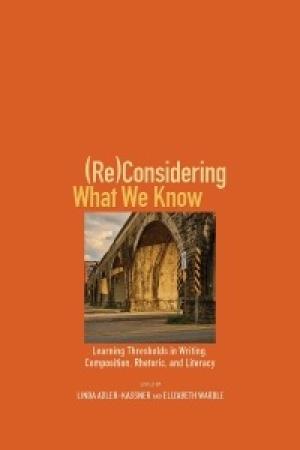
Naming What We Know: Threshold Concepts of Writing Studies, published in 2015, contributed to a discussion about the relevance of identifying key concepts and ideas of writing studies. (Re)Considering What We Know continues that conversation while simultaneously raising questions about the ideas around threshold concepts. Contributions introduce new concepts, investigate threshold concepts as a framework, and explore their use within and beyond writing. Part 1 raises questions about the ideologies of consensus that are associated with naming threshold concepts of a discipline. Contributions challenge the idea of consensus and seek to expand both the threshold concepts framework and the concepts themselves. Part 2 focuses on threshold concepts in action and practice, demonstrating the innovative ways threshold concepts and a threshold concepts framework have been used in writing courses and programs. Part 3 shows how a threshold concepts framework can help us engage in conversations beyond writing studies. (Re)Considering What We Know raises new questions and offers new ideas that can help to advance the discussion and use of threshold concepts in the field of writing studies. It will be of great interest to scholars and graduate students in writing studies, especially those who have previously engaged with Naming What We Know. (From the Publisher)
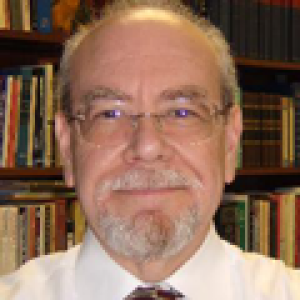
Growing up, one of my all-time favorite TV cartoons was Quickdraw McGraw and his faithful companion, Babalooi (does that date me?). Do you remember it? Quickdraw was the noble but naive, quick-on-the-trigger sheriff who fought off wicked desperados who inevitably found their way into his small, quiet prairie town. Sheriff Quickdraw’s first attempt at stopping a criminal type was to cry out, “Cease and desist!” Of course, it never worked. What hardened criminal would desist bad behavior just because you tell them to? Which brings up the question, when learners misbehave, how do you get them to desist without disrupting the learning process? While those of us who teach graduate level courses rarely have classroom management problems as those in undergraduate and lower grades, when they do happen, they can derail the learning experience. I once had to dismiss an adjunct in a graduate course mid-semester due to her poor handling of classroom management issues, mostly due to her inexperience. Because she was not able to get her classroom under control early by providing effective interventions (desists), things just got worse, to the point that the situation became unsalvageable. Fortunately, there are effective ways for a teacher to say “Cease and desist” to stop off-task behavior and get learning back on track. A teacher who knows how to stop class disruption before it spreads not only stops the deviancy, but at the same time has a positive effect on other learners in the class. A desist is an action the teacher makes to stop off-task learner behavior. The trick of course, is to use desists which not only stop unwanted behavior but will not also distract the other learners in the class. For example, if a teacher uses angry, punitive desists, then the acting out learner may stop his or her misconduct, but the ripple effect on the other learners will cause an increase in emotional anxiety which disrupts learning, and possibly causes additional unwanted disruptive behavior. An effective teacher gives attention to the quality of desist, those characteristics of teacher behavior used to stop disruptive learner conduct. Quality of desist has three indicators: Clarity, Roughness, Task-Force, and Approval-Focus. Clarity of Desist. Clarity refers to behavior on your part that specifies who the acting-out learner is, what he or she is doing wrong, and why this is improper behavior or what the proper behavior is. Roughness of Desist. Roughness refers to the way an attempt to stop misbehavior expresses impatience and anger, or ways the teacher's facial or bodily behavior expresses anger. Task-Force Desist. The task-force desist refers to ways you direct learners to the task at hand as the desist is given. Major Deviance Desist. In this teacher behavior, the teacher selects the major disruption when two or more deviancies occur simultaneously. The rule is to focus on the major disruption and ignore the lesser. Correct Target Desist. In this behavior, the teacher desists the learner who caused the disruption, not a bystander. Approval-Focus Desist. In this student-affirming teacher action, you make a statement that implies your warmth toward and feeling for the learners. This type of desist loses its effectiveness after about the third grade. Research in classroom management indicates that: Soft reprimands are more effective in controlling disruptive behavior than loud reprimands, and that when soft reprimands are used, fewer are needed Learners who witnessed a punitive or angry desist responded with more behavior disruption than when they observed a desist without roughness Task-focused desists resulted in more favorable ripple effect on the conduct of learners than the approval-focus desists When a simple reprimand was observed, learners felt the teacher was fairest and able to maintain control. Learning effective desist techniques is one of the most valuable skills a teacher can master. A teacher who can minimize time spend on classroom and behavior management will increase the time he or she has for actual teaching and instruction. One study found that teachers trained in specific management behaviors, including the use of positive questioning techniques and soft reprimands/desists, decreased the amount of non-instructional time by 20 minutes per day! SOURCES: Becker, W.C. et al. Production and elimination of disruptive classroom behavior by systematically varying teachers’ behavior. Journal of Applied Behavior Analysis (1968) 1:35-45. Borg, W.R. et al. Teacher classroom management skills and pupil behavior. Journal of Experimental Education (1975) 44:52-58. Emmer, E.T., et al. Effective Classroom Management at the Beginning of the School Year. Elementary School Journal (1980) 80: 219-231. Kounin, J.S. Discipline and Group Management in Classrooms. New York: Holt, Rinehart and Winston (1970).
In episode 2 of Dialogue on Teaching, Wabash Center Director Dr. Nancy Lynne Westfield talks with Latinx professors of higher education as they discuss their perspectives on race critical consciousness and essentialism. Guests include Dr. Efrain Agosto (New York Theological Seminary), Dr. Gregory L Cuéllar (Austin Presbyterian Theological Seminary), and Dr. Teresa Delgado (Iona College).
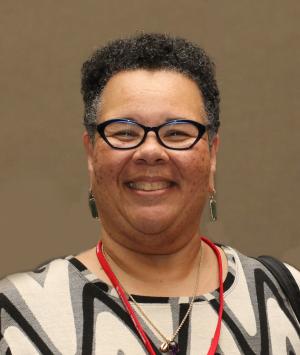
One of my favorite reality TV shows is Project Runway. It is a contest of fashion designers who compete by designing new garments each week. Each episode the designers receive a new design challenge. The episode ends with renowned fashion designers judging the garments made by the contestants, then eliminating the weakest design. While I know the producers control the storyline of each episode, my fascination is in watching the ways the contestants grapple with the challenges of design, of being creative, of being human, of problem solving. Watching artists create a new garment in the context of a challenge intrigues me as I think about the work of teaching and learning to bring forth the voice. A favorite episode involved a most difficult challenge. The designers were instructed to create a garment based upon some aspect of New York City – the aspect of the City was of their own choosing – the contestants were led to believe that this was the entire challenge. They were given time to sketch, then were taken to the fabric store to purchase fabrics. Once they got back to the work room a twist was added to the challenge. The designers were instructed to switch their bags of fabric with another designer. In other words, they had to create a garment using the fabric another designer had selected. This unexpected twist sent the designers reeling! The camera vividly showed the designers in shock, in panic, in fear. Emotional turmoil seized the group. The usually chatty, noisy, electric work room was still, and the mood was somber. Some designers became angry and railed and cussed. Others cried. One designer was so stymied she considered dropping out of the competition because the fabric she was given was unfamiliar to her and not to her taste. The story line of the episode showed the designers, in multiple ways, rally to the challenge; the designers struggled and found unanticipated ways to solve the problems of the challenge. They found new solutions in the repertoire of design. By the run-way show – all designers had garments to show. The judges commented that so many of the pieces looked new, fresh compared to previous week’s work. The judges praised the group of designers for solving the problem well and with a refreshing aesthetic. Design is problem solving. Cultural aesthetics are not generic nor universal. Cultural aesthetics are determined by solving problems in particular contexts and arriving at solutions which have political implications and aesthetic qualities. If we had the eye to see, we would recognize that we are surrounded by, immersed in, design. Our coffee pots and mugs are designed. Computer keyboards are designed then redesigned. Our national and international transportation systems (on the grandest scale) are designed. From the smallest detail of life to the meta-patterns of society – design choices are made by us and for us. The design of a building portrays the architect’s philosophy. Visible to the eye, as well as experienced while walking through the building, is the architect’s beliefs about the nature of humanity. The viewpoint of the architect is expressed in the use of sunlight, the means and methods of access, the places of privacy and the materials which construct the walls, floors, and door knobs. The use of line, space, color, contrast (value), form, texture and space translate his/her understanding of human bodies and the ways we work, play and live in community. Architects become known for their “look” – their style, their aesthetic opinion and viewpoints. Even as laypersons, we recognize the work of Frank Lloyd Wright, I.M. Pei and Leonardo da Vinci. The same could be said about the work of many kinds of designers. In fashion, the aesthetic of Jason Wu, Betsy Johnson, and Donna Karen are easily recognized. In dance, the choreography (design) of Alvin Ailey, Judith Jamison, Katherine Dunham and Robert Battle are revered. To push the notion of design into sports – the genius of Venus and Serena Williams as designers on the tennis court is renowned the world over. Design expresses the voice. The voice evolves, matures and refines over the lifetime of the designer. Designers find, summon and bring forth new answers to old problems over their years of work. The longer they design the more they discover, uncover, and become aware of new expressions for their own point of view. The more they express their point of view, the more their opinion sharpens and hones. Designers interpret and reinterpret their truths searching for ways to say to the world what they are thinking, feeling, knowing, becoming and believing. Victor Wooten, Grammy Award winning jazz musician says it like this, “…an instrument laid on the ground makes no sound. It is the musician who must bring Music forth, or not.” What if, just as the philosophy of the architect is revealed in the blue prints and in the building, the voice of the teacher is revealed in the syllabus and classroom experience? What if, as teachers, we think of ourselves as designers? What if, in creating our syllabi and planning our teaching lessons we considered the line, space, color, contrast, form, texture and space of the course and classroom dynamics – not as whimsy, folly, but with the intent of expressing our genuine voice as critically reflective teachers? Since design is problem solving, we cannot trivialize this work by saying our students are the problem; that would be like a painter saying the easel and canvas are the problem. Nor can we say the topic at hand is the problem. Teacher/designers, like all designers, know that the problem to be solved is one of expressing the authentic voice of the teacher and inspiring the authentic voice of the student. In the words of Professor Nel Morton, our task is to “hear each other into speech.” The metric of good teaching is not figuring out a formula for the classroom then inflicting that formula upon students for an entire teaching career. Designers are after something more than the routine or the generic. Design sensibilities invite teachers to avoid teaching that is tantamount to fast food meals or paint-by-number kits. They challenge teachers to avoid teaching which is sterile, tasteless and steers learners “down a narrow road toward a destination not of their own.” (Wooten) Designers and artists invite new thinking and learning experiences to make the learning sticky, lasting, participatory and beautiful. Suppose you were to take out a large, ample sampling of your syllabi, then arrange them chronologically. Spread them out on the floor (or the computer screen). Look for the ways your teaching voice has matured, evolved, shifted and become more refined. What does your voice taste like, sound like, look like, feel like, smell like in the classroom? What is the line, space, color, contrast (value), form, texture and space of your teaching? If you cannot answer these questions – ask your students – they know. No one is born able to articulate their authentic selves. No one is born knowing their voice or design aesthetic. No one comes into the world knowing how to teach. It takes years to craft and refine your authentic voice – it evolves through work, rehearsal, practice, mistakes, and achievements. Recognizing our individual and collective power to get another person to express themselves freely is the insight toward freedom for both teacher and learner.
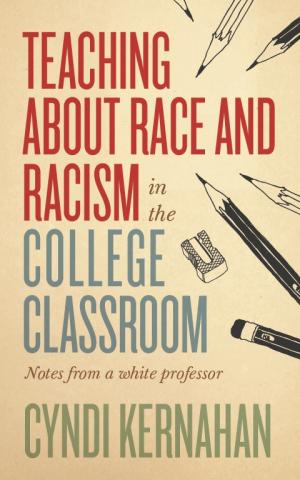
Teaching about race and racism can be a difficult business. Students and instructors alike often struggle with strong emotions, and many people have robust preexisting beliefs about race. At the same time, this is a moment that demands a clear understanding of racism. It is important for students to learn how we got here and how racism is more than just individual acts of meanness. Students also need to understand that colorblindness is not an effective anti-racism strategy. In this book, Cyndi Kernahan argues that you can be honest and unflinching in your teaching about racism while also providing a compassionate learning environment that allows for mistakes and avoids shaming students. She provides evidence for how learning works with respect to race and racism along with practical teaching strategies rooted in that evidence to help instructors feel more confident. She also differentiates between how white students and students of color are likely to experience the classroom, helping instructors provide a more effective learning experience for all students. (From the Publisher)